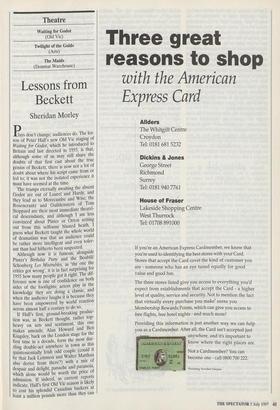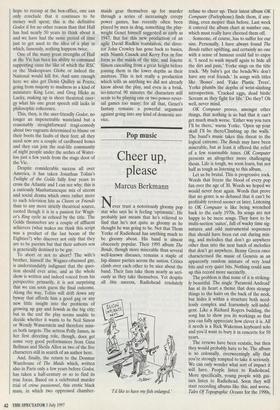Theatre
Waiting for Godot (Old Vic) Twilight of the Golds (Arts) The Maids (Donmar Warehouse)
Lessons from Beckett
Sheridan Morley
Plays don't change; audiences do. The les- son of Peter Hall's new Old Vic staging of Waiting for Godot, which he introduced to Britain and last directed in 1955, is that, although some of us may still share the doubts of that first cast about the true genius of Beckett, there is now not a lot of doubt about where his script came from or led to; it was not the isolated experience it must have seemed at the time.
The tramps eternally awaiting the absent Godot are out of Laurel and Hardy, and they lead us to Morecambe and Wise; the Rosencrantz and Guildenstern of Tom Stoppard are their most immediate theatri- cal descendants, and although I am less convinced about Pinter or Orton setting out from this selfsame blasted heath, I guess what Beckett taught the whole world of dramatists was that an audience could be rather more intelligent and even toler- ant than had hitherto been suspected. Although now it is famous, alongside Pinter's Birthday Party and the BoubliV Schonberg Les Miserables, as 'the one the critics got wrong', it is in fact surprising for 1955 how many people got it right. The dif- ference now is one of confidence on both sides of the footlights; actors play in the knowledge they are doing a classic, and when the audience laughs it is because they have been empowered by world reaction across almost half a century to do so. If Hall's first, ground-breaking produc- tion was, as Beckett thought, rather top- heavy on sets and sentiment, this one makes amends; Alan Howard and Ben Kingsley, back on the London stage for the first time in a decade, form the most daz- zling double-act anywhere in town as this quintessentially Irish odd couple (could it be that Jack Lemmon and Walter Matthau also derive from there?) with a mix of despair and delight, panache and paranoia, which alone would be worth the price of admission. If indeed, as current reports indicate, Hall's first Old Vic season is likely to cost his splendid Canadian backers at least a million pounds more than they can hope to recoup at the box-office, one can only conclude that it continues to be money well spent; this is the definitive Godot if for no other reason than that Hall has had nearly 50 years to think about it and we have had the same period of time just to get used to the idea of a play in which, famously, nothing happens twice.
One of the many great strengths of Hall at the Vic has been his ability to command supporting casts the like of which the RSC or the Shakespeare Globe or indeed the National would kill for. And sure enough here we also get Denis Quilley as Pozzo, going from majesty to madness as a kind of miniature King Lear, and Greg Hicks as Lucky, making up in sheer theatrical ener- gy what his one great speech still lacks in philosophic coherence.
This, then, is the user-friendly Godot, no longer an impenetrable wasteland but a reasonably straightforward tragi-comedy about two vagrants determined to blame on their boots the faults of their feet; all they need now are a couple of cardboard boxes and they can join the real-life community of night people under the arches of Water- loo just a few yards from the stage door of the Vic.
Despite considerable success all over America, it has taken Jonathan Tolins's Twilight of the Golds fully four years to cross the Atlantic and I can see why; this is a curiously Manhattanesque mix of sitcom and social drama which owes rather more to such television hits as Cheers or Friends than to any more strictly theatrical source, rooted though it is in a passion for Wagn- er's Ring cycle as echoed by the title. The Golds themselves are a couple of affluent achievers (what makes me think this script was a product of the last boom of the Eighties?) who discover not only that they are to be parents but that their unborn son is genetically destined to be gay.
To abort or not to abort? The wife's brother, himself the Wagner-obsessed gay, is understandably indignant that the ques- tion should ever arise, and as the whole show is written and indeed voiced from his perspective primarily, it is not surprising that we can soon guess the final outcome. Along the way, Tolins will drift down any byway that affords him a good gag or any new little insight into the problems of growing up gay and Jewish in the big city; but in the end the play seems unable to decide whether it wants to be Neil Simon or Wendy Wasserstein and therefore miss- es both targets. The actress Polly James, in her first directing role, though, does get some very good performances from Gina Bellman and Sheila Allen as two of the five characters still in search of an author here.
And, finally, the return to the Donmar Warehouse of The Maids which, written also in Paris only a few years before Godot, has taken a half-century or so to find its true focus. Based on a celebrated murder trial of crime passionnel, this erotic black mass, in which two oppressed chamber- maids gear themselves up for murder through a series of increasingly creepy power games, has recently often been played by men in drag, something the play- wright Genet himself suggested as early as 1947. But for this new production of an agile David Rudkin translation, the direc- tor John Crowley has gone back to basics, with Niamh Cusack and Kerry Fox in fine form as the maids of the title, and Josette Simon cascading from a great height before joining them in the lower depths as their mistress. This is not really a production which tells us anything we did not already know about the play, and even in a brisk, no-interval 90 minutes the characters still seem to be playing one or two power-rever- sal games too many; for all that, Genet's fantasy remains a powerful argument against going into any kind of domestic ser- vice.



























































 Previous page
Previous page